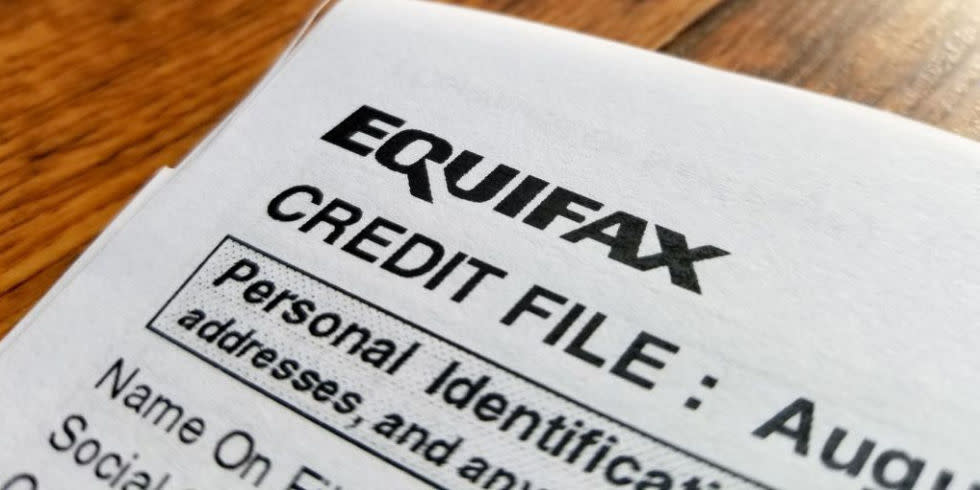You Could Be Entitled to Money From the Equifax Security Breach

If you're one of the 143 million whose credit information was compromised as part of the Equifax security breach, you may be wondering if you have any rights when it comes to taking legal action against the company. Considering that the cyberattack leaked names, birth dates, addresses, credit card numbers and full Social Security numbers, it's likely that a class action lawsuit may be filed on your behalf, and you may be entitled to some monetary compensation as a result.
Since the announcement of the attack last month, over 50 class action lawsuits have allegedly been filed against the credit company. Previously, consumers, who may have signed up for the TrustedID Premier program that Equifax recommended as a free credit monitoring option after the breach, were concerned that by opting into the service, they were signing a binding arbitration clause that would forfeit their right to join a class action lawsuit against Equifax. However, according to Tech Crunch, the company has since announced that this clause would not be applied to victims of the credit breach or to those who signed up for the service after learning their data was compromised.
So yes, it's likely if you were affected by the breach that you are eligible to join a class action lawsuit against the company, but before you do it's important to consider your other options.
Here's what to consider:
Lawyers are typically the ones to initiate class action lawsuits after a number of consumers are reportedly harmed when a company engages in alleged unlawful activity. While it won't cost you anything, it's important to note that when you participate in this type of suit, you're giving up the right to sue the company on your own. This can become problematic if you've suffered serious financial damages, physical harm or other losses because of the alleged unlawful activity as being a part of a class action lawsuit typically don't result in a large compensation. You are able to opt out of the class action in order to sue on your own, but by doing so, you forfeit any settlements from that particular lawsuit.
That being said, Jeff Sovern, a professor of law at St. John's University, says if you weren't planning to sue on your own, you have little to lose by joining in.
"If you believe you have a valid claim but you aren't going to bother to sue separately, and you think the settlement is likely to benefit you (e.g., if money will be deposited directly into your bank account without you doing anything or if you believe you would file the claim forms), then you gain something by joining without losing anything," he explained to GoodHousekeeping.com.
Brian T. Fitzpatrick, a professor of law at Vanderbilt University Law School, who specializes in class action litigation agrees, saying he generally recommends that people stay in class action law suits.
"It is very hard to sue on your own," he explained. "You will almost always get more by staying in a class action than by trying."
If you are considering filing your own lawsuit, you'll want to keep an eye out for any class action letters that you may receive. From there, you can talk to an attorney about the option of opting out so that you can preserve your rights to an individual lawsuit.
If you were a victim of the Equifax breach, Fitzpatrick says that you can generally assume that someone is suing right now on your behalf.
"But remember: Your rights will not be affected until the opt out notice arrives, so there is little reason to worry about these lawsuits until then."
How much settlement money will you get?
Because the already-filed class actions lawsuits are in the early stages, it may be awhile before you see any sort of return. Right now, the lawsuits can't continue without the approval of the courts, and there is a chance that the 50+ suits could be consolidated into a one case.
That being said, don't expect the settlement amount to be life changing even when it does come, especially considering how many people were involved in the breach.
"Most of us have been harmed in only small amounts thus far by Equifax," explains Fitzpatrick.
For example, in one class action lawsuit filed against Equifax in the U.S. District Court in Oregon on Sept. 7, one plaintiff's loss was just $19.95, according to Consumer Reports, which was the amount he paid for a third-party credit monitoring service after he found out about the breach. So it's unlikely that he'll get more than that back in his return.
Even if your losses were small, Fitzpatrick recommends keeping track of them over the next few months, as they may be beneficial down the road.
"Keep track of how much time and money [you] have spent placing freezes and fraud alerts on [your] accounts," he explains. "[You] may be able to submit that information to increase [your] recovery from any class action settlement. Keep track of any other expenses or inconveniences you incur as well."
In a comment to GoodHousekeeping.com, an Equifax spokesperson said the following regarding the pending class action lawsuits:
"We cannot comment on pending litigation, but want to reassure consumers that we are remaining focused on helping them to navigate this situation and providing the best customer support possible. We are listening to issues consumers have experienced and their suggestions, which are helping to further inform our actions as we continue to improve this process."
You Might Also Like

